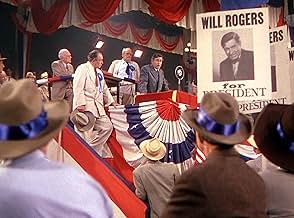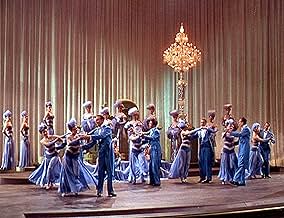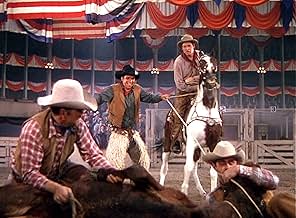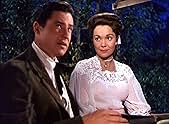The homespun humorist and social critic starts as a cowboy and goes on to vaudeville, movies, and radio.The homespun humorist and social critic starts as a cowboy and goes on to vaudeville, movies, and radio.The homespun humorist and social critic starts as a cowboy and goes on to vaudeville, movies, and radio.
Todd Karns
- 1st Mechanic
- (scenes deleted)
J. Carrol Naish
- Narrator
- (voice)
Dub Taylor
- Actor
- (scenes deleted)
Victor Adamson
- Townsman Greeting Will
- (uncredited)
Leon Alton
- Rodeo Spectator
- (uncredited)
Featured reviews
It's early 20th century. Humble cowboy Will Rogers (Will Rogers Jr.) returns to Oologah, Oklahoma. Betty (Jane Wyman) takes little notice of another cowboy's arrival but soon the two become a couple. Eventually, he becomes one of the most popular American humorist and home-spun political commentator.
This is an autobiography of Will Rogers as told by his widow. Will Rogers is well before my time. He comes from another era. I don't know any specifics from his work but I do understand his general tone. It's a call to the old west and America's promise. He's a nice little guy and the little guy can be great in America. This movie taps into that. He's the regular Joe. I have no nostalgia for the man or the era. I do find this movie to give a sense of both. One thing I didn't know is that so much of his work is topical and political. There isn't much drama with this movie but it does what it's supposed to do.
This is an autobiography of Will Rogers as told by his widow. Will Rogers is well before my time. He comes from another era. I don't know any specifics from his work but I do understand his general tone. It's a call to the old west and America's promise. He's a nice little guy and the little guy can be great in America. This movie taps into that. He's the regular Joe. I have no nostalgia for the man or the era. I do find this movie to give a sense of both. One thing I didn't know is that so much of his work is topical and political. There isn't much drama with this movie but it does what it's supposed to do.
This one is now out on DVD in the Warner Archives Collection. I saw this picture when it first came out - I was 11 at the time and I wanted to see if it held up in the ensuing 58 years, and I'm pleased to report it is just as entertaining and absorbing the second time around.
Such is not always the case. I did the same thing with "The High And The Mighty", and was disappointed at how trite and stagey the picture seemed when I saw it recently. But "Will Rogers" holds up, probably because it is a biography of a very famous American from the early part of the last century. Then as now, I was fascinated by what a dead ringer for his dad Will Rogers, Jr. was. I also think the movie benefited from a superior direction job.
Can I make one criticism? I didn't think Jane Wyman fit the part of a girlfriend/ wife from Oologah, Okla. She was too sophisticated, like a society chick from Riverside Drive who wouldn't bother with a bumpkin from Oologah. But that's just me.
In any case, this is worth buying and watching. I don't think it will be on TV any time soon as there are two scenes of Eddie Cantor and Al Jolson performing in blackface. Can't upset the PC crowd, you know.
Such is not always the case. I did the same thing with "The High And The Mighty", and was disappointed at how trite and stagey the picture seemed when I saw it recently. But "Will Rogers" holds up, probably because it is a biography of a very famous American from the early part of the last century. Then as now, I was fascinated by what a dead ringer for his dad Will Rogers, Jr. was. I also think the movie benefited from a superior direction job.
Can I make one criticism? I didn't think Jane Wyman fit the part of a girlfriend/ wife from Oologah, Okla. She was too sophisticated, like a society chick from Riverside Drive who wouldn't bother with a bumpkin from Oologah. But that's just me.
In any case, this is worth buying and watching. I don't think it will be on TV any time soon as there are two scenes of Eddie Cantor and Al Jolson performing in blackface. Can't upset the PC crowd, you know.
When they discuss the great movies of director Michael Curtiz, they start with Casablanca, which may well be the greatest American movie - for which he earned a well-deserved Oscar - and go on to such screen gems as The Adventures of Robin Hood, Captain Blood, The Sea Hawk, Yankee Doodle Dandy (which is a slow movie with a great performance by its star), Life with Father, and a host of others. I doubt anyone would think to mention this movie.
And The Story of Will Rogers is not a great movie. It does not move with the relentless drive of Casablanca or Robin Hood, it does not sparkle like Life with Father. Seventeen years after his untimely death in 1935, it tells the story of the then still well-remembered American humorist, Will Rogers. Since everyone still knew his story then, the movie did not have to tell it; rather, it picked the moments that it wanted to stand out.
That isn't Rogers' years in the Ziegfeld Follies, which made him a household word, or his appearance in movies, even through, for a short while, he was the biggest box office attraction in talkies.
Rather, it concentrates on Rogers' support of General William (Billy) Mitchell and his efforts to get Congress to put money into air power at a time when the U.S. was pulling back into isolationism. World War II and the terrifying German blitzkrieg would eventually show that Mitchell and Rogers were right.
It also concentrates, in the last part, on Rogers' fund raising for the poor during the depths of the Depression. That, too, is an aspect of Rogers' career that is probably forgotten today.
This movie won't keep you glued to your seat. But it does serve to remind us, now that there are few among us who remember seeing and hearing Rogers, what warm-hearted pleasure he brought to Americans when so many of us needed a smile so badly. His sense of humor may seem corny today - it was corny back then, too - but there is a lack of nastiness or derision to it that I often miss today.
And The Story of Will Rogers is not a great movie. It does not move with the relentless drive of Casablanca or Robin Hood, it does not sparkle like Life with Father. Seventeen years after his untimely death in 1935, it tells the story of the then still well-remembered American humorist, Will Rogers. Since everyone still knew his story then, the movie did not have to tell it; rather, it picked the moments that it wanted to stand out.
That isn't Rogers' years in the Ziegfeld Follies, which made him a household word, or his appearance in movies, even through, for a short while, he was the biggest box office attraction in talkies.
Rather, it concentrates on Rogers' support of General William (Billy) Mitchell and his efforts to get Congress to put money into air power at a time when the U.S. was pulling back into isolationism. World War II and the terrifying German blitzkrieg would eventually show that Mitchell and Rogers were right.
It also concentrates, in the last part, on Rogers' fund raising for the poor during the depths of the Depression. That, too, is an aspect of Rogers' career that is probably forgotten today.
This movie won't keep you glued to your seat. But it does serve to remind us, now that there are few among us who remember seeing and hearing Rogers, what warm-hearted pleasure he brought to Americans when so many of us needed a smile so badly. His sense of humor may seem corny today - it was corny back then, too - but there is a lack of nastiness or derision to it that I often miss today.
This is an excellent film with an outstanding cast, and a very authentic feel to the overall presentation. Will Rogers, Jr. becomes Will Rogers, Sr. This is a good story about an outstanding "American" personality, and it should definitely be made available on video for all "Americans" to see, especially during these trying times when patriotism, honesty and goodwill could use a shot-in-the-arm. Hopefully it will be make the step to video in the very near future.
Most biopics leave a lot to be desired...especially those made during the classic era in Hollywood. Too often the actual lives of these heroes have been changed in order to make them seem more cinematic....and lying and twisting the facts is pretty much par for the course. Some films don't even have much to do with the actual person they are portraying (such as "Night and Day" and "Words and Music").
In light of this, I was shocked that for the most part "The Story of Will Rogers" is mostly the actual life and career of the man! Now I am not saying it's perfect, as for example, Will's father had died long before and the film must have assumed the man was a zombie! But apart from that and a few small items, the film IS the life of Will Rogers.
To play the man, the studio did something unusual. First, they consulted with Rogers' widow (why they actually wanted to get the facts right is beyond me!). Second, they got Rogers' son, Will Jr., to play him. Now Will Jr. Didn't look exactly like his dad (I think he actually looked more like Chill Wills), but he was pretty close and captured the man pretty well.
Why do I think they got Rogers' life right? Well, I think two reason account for this. First, Rogers DID so many amazing things that there wasn't the same need to embellish it to 'spice it up'. Second, as Rogers was such a public figure, had they NOT stuck to the facts, folks would have noticed.
So, overall it's a very good film and an excellent overview of the actor/humorist's life. Well worth seeing.
In light of this, I was shocked that for the most part "The Story of Will Rogers" is mostly the actual life and career of the man! Now I am not saying it's perfect, as for example, Will's father had died long before and the film must have assumed the man was a zombie! But apart from that and a few small items, the film IS the life of Will Rogers.
To play the man, the studio did something unusual. First, they consulted with Rogers' widow (why they actually wanted to get the facts right is beyond me!). Second, they got Rogers' son, Will Jr., to play him. Now Will Jr. Didn't look exactly like his dad (I think he actually looked more like Chill Wills), but he was pretty close and captured the man pretty well.
Why do I think they got Rogers' life right? Well, I think two reason account for this. First, Rogers DID so many amazing things that there wasn't the same need to embellish it to 'spice it up'. Second, as Rogers was such a public figure, had they NOT stuck to the facts, folks would have noticed.
So, overall it's a very good film and an excellent overview of the actor/humorist's life. Well worth seeing.
Did you know
- TriviaThe real Eddie Cantor appears as himself in support of Will Rogers, Jr. who portrays his father, a contemporary of Cantor's. The next year Rogers, Jr. would return the favor, again appearing as his father in The Eddie Cantor Story. Both films were made by Warner Brothers.
- GoofsWhen Will Rogers is addressing the bankers at 1:17:00 in, there are 2 old style microphones on the table in front of him. The one on the left of the screen, Rogers' right, is missing one of the suspension springs between the mic cartridge and the frame. It also has no wire attached to it, so it couldn't possibly function.
- Quotes
Will Rogers: Well it looks like the women are finally gonna get the vote. A lot of men say they shouldn't be trusted with it. Seems kind of silly to stop trustin' them now after eatin' their cookin' for 4000 years.
- ConnectionsEdited from Rhapsody in Blue (1945)
- SoundtracksHome on the Range
(uncredited)
Music by Daniel E. Kelley
Lyrics by Brewster M. Higley
Played at the beginning and during the opening credits
Sung at the Rogers party and used often in the score
Details
- Runtime1 hour 49 minutes
- Aspect ratio
- 1.37 : 1
Contribute to this page
Suggest an edit or add missing content



































